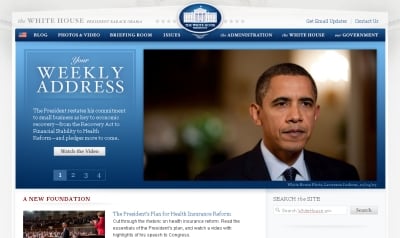
Last October, Drupal made a big splash when it was chosen for the redesign of WhiteHouse.gov. Though it was far from the first or last government site in Drupal, for some (especially in this country), it put Drupal on the map in the government space. Since the White House site launched, Drupal has been chosen by the British government, the King of Belgium, Queen Rania of Jordon, the Jamaican Prime Minister, the City of Athens, and other government entities. Why has Drupal become so popular in this area? Here are four reasons why.
Easy to Post Current Information
On most government websites, the ability to post current information regarding an event, issue or crisis is imperative. In some cases there may be important information that cannot wait for an IT person to have the time to post it to the website. The CMS aspect of the Drupal platform is a huge selling point for many government agencies, because it means that practically anyone within their organization can post content to their website without delay.
Secure
Another reason governments are jumping on the Drupal bandwagon is that they are recognizing the superior security of Drupal, and open source in general. For a long time, a supposed lack of security was one of the biggest myths surrounding open source. Today, however, many are realizing (correctly so) that the open source model leads to more secure solutions. With a development community of hundreds, or even thousands, security gaps are identified and remediated much more quickly than the development cycle of proprietary software will allow. For obvious reasons, site security is of the utmost importance to government agencies.
Cost Effective
As an open source platform, Drupal minimizes the initial investment of building (or re-building) a website, and often proves to be the most cost-effective solution. Today, most governments are dealing with tight budgets and trying to save money any way that they can. This is another reason why Drupal has become an appealing choice.
Future Flexibility
When you choose proprietary software, you are more or less at the mercy of the product developer with regards to new features and functionality. They decide when new releases are offered, and which features those new releases contain. With open source, the product owner is in control. New functionality can be developed and added to your site as it is desired. The functionality you are looking to add may already exist in the form of a community-contributed module; if not, you can choose to develop it yourself. This gives owners of open source sites an increased level of flexibility.
Though this particular post talks about how governments around the world have latched onto the Drupal platform, the reasons listed above make Drupal an appealing choice for any business or organization. In fact, Drupal is growing very rapidly in all areas (corporate, nonprofit, education, etc.) for these reasons and more. As always, if you would like to learn more about the unique benefits that Drupal can offer your business or organization (or government!), get in touch with us today.


